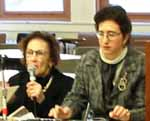Entrepreneurial Spotlight: Colette Mazzucelli
Colette Mazzucelli is putting her own 21st-century twist on E.M. Forster's famous exhortation, "Only connect!"
By Suzanne Guillette
Bensonhurst is not generally known as a geopolitical epicenter, but from her apartment in that quiet Brooklyn neighborhood, Colette Mazzucelli uses two computers to monitor unfolding crises in locations as far-flung as Libya – all before her official workday begins.
Mazzucelli, an Ed.M. candidate in TC’s International & Transcultural Studies program, is one of 400 “crisis mappers” with the Standby Task Force, a network of volunteers that supports existing emergency response mechanisms. The Task Force’s mappers log in from around the world to patch together a real-time picture of situations such as the current crisis in Libyan so that aid groups can address humanitarian needs.
On one of her computers, Mazzucelli uses the Ushahidi platform, an open-source software program that lets people in geo-political hotspots and disaster zones instantaneously upload videos, text messages, Twitter tweets and other online information via a mobile phone to share with a global audience. The technology arguably facilitates a form of citizen activism.
Meanwhile, on her Dell Mini, Mazzucelli boots up Skype, an Internet phone, so that she can transmit what she has learned from Ushahidi to humanitarian aid workers on the ground.
The Task Force got involved with Libya on March 1 at the request of the UN Office for the Coordination of Humanitarian Affairs. As a member of the group's verification team, Mazzucelli ascertains specific requests for material support -- from hospitals, for example -- and then looks for confirmation from other sources. Read about the Libya Crisis Map on Fast Company.
For Mazzucelli, an adjunct professor at the Center for Global Affairs at New York University and the Department of Political Science at Hofstra University, crisis mapping is an extension of her work as an educator. Mazzucelli received a Master of Arts in Law and Diplomacy from Tufts’ Fletcher School and a Ph.D. in Government from Georgetown. Eager to learn more about the use of technology in the classroom, she took adjunct professor Nabeel Ahmad’s Mobile Phone Learning course upon arriving at TC. “As technology develops, it is very important to bring these dynamic resources into the classroom,” she says.
Mazzucelli continues to find innovative ways to connect the classroom to the wider world. At NYU, she is gearing up to teach a regional course on India, which she is organizing by modules on topics such as the caste system, health, women’s issues and government. For each module, Mazzucelli will use Skype to link her class with people based throughout India, including a doctor in Mumbai and a literacy expert in Kerala, where the literacy rate is at 90 percent.
Mazzucelli is also passionate about linking fellow educators to cutting-edge resources. She participated in an event at CDS International on March 23 suggested by Lisa Brown, Producer/Director of STARLINK Media, in which Mazzucelli talked about incorporating “technology-mediated learning” into the classroom. Brown filmed one of Mazzucelli’s Skype modules in which a Belgrade-based colleague with the German Marshall Fund discussed the Balkan Trust for Democracy, a 10-year, $36 million grant-making initiative dedicated to democracy and good governance. The video segment is presently in distribution to institutions of higher learning across North America.
Mazzucelli has also been a strong supporter of DevInfo, a database system that has helped teachers and students access up-to-date statistics and information from countries across the globe. DevInfo is based on a technology that is endorsed and managed by UNICEF. Mazzucelli says the program is “beautiful because it translates numbers into maps,” making complex data available in the classroom.
For all the ways she has embraced technology in the classroom, Mazzucelli nonetheless cautions that “pedagogy is king. Technology can support human agency, but it’s up to humans to decide.”
Read more about The Standby Task Force http://blog.standbytaskforce.com/?p=329.
Published Thursday, May. 12, 2011
